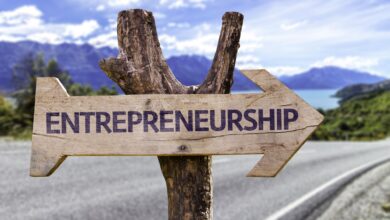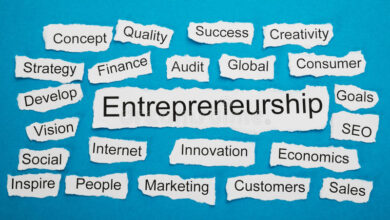
3 Lies Entrepreneurs Believe That Make Them Fail (And How to Succeed Now)
PART ONE
LOOK AT STARTUP LIFE REALITY
“Startup life.” That’s the term you’ll hear on the outskirts of Market Street, San Francisco, around 3:17am. Founder and startup-posse alike, wait together for their respective Ubers, after a couple hours of drinking, following an already long day at work. They’ve already hustled for 18–20 hours, with no sleep, and they turn to each other and shrug over the insanity of it all. “Startup life,” they say.
“No time”: the badge of honor that shouldn’t be.
Long days.
The startup grind starts at 6ish, and you roll into the co-working office space where you work alongside 26 other startups around 7am.
…there’s a coffee and butter bar to keep things Bulletproof.
…there’s a lot of Redbull-and-snacking around the shared, rectangle desk.
…there’s nowhere quiet for personal calls. So the on-demand meeting and phone rooms become sanctuaries where you can take a breath and pretend the others actually believe you’re on a call with a new potential partner until your shared space time is up.
…then, at some point, probably around 1am (time flies), someone recommends drinks.
…everyone waits for Kenny to finish up his last line of code.
…then you all head to a random (not so random) anti-(not-so-anti)-hipster, corner bar, where you find other founders and their respective posses, just like you.
Startup life: it’s a good vibe.
Cities tend to hone in on the bachelor vibe.
This same hustle plays out in New York, Austin, Toronto, San Diego, Seattle, Phoenix, Boston, Hong Kong, Nashville, São Paulo…everywhere. Startup life is more of an extension of the college scene than anything. It’s energizing. It’s addicting. It’s also just more of the same.
Many people are leaving the city startup life to get a life in the burbs (fresh air, fresh ideas).
The suburbs tend to be less “bachelor-y.” More married folk. Kids running around. The long day hustle tends to be the same, but with a twist: more people are counting on you to feed their mouths and put Nikes on their feet. While it’s nice the founders and some of your co-workers have families to love, in the suburbs, the grind simply follows you home instead of to the bar.
In the suburbs, the grind follows you home instead of to the bar.
Are the results of startup life worth the extra hours?
If the statistics about startups are true, most fail. Does that mean the hustle inherent to startup life doesn’t work? Maybe. Sometimes. Sometimes, maybe not.
What happens when the grind isn’t producing desired results?
With the numbers (or the lack thereof) startups are putting up and with the fails they are experiencing (fail forward! fail fast!), the batting average of startups is bad. So bad, in fact, it’s like no one’s even swinging. But we are swinging. Hard. We’re just swinging for the fences and striking out.
…until we hit the sweet spot.
Unicorns are the exception, not the rule.
Generally speaking, a unicorn is a company that could have as little as zero sales, no cash flow at all, and still gets sold for a billion dollars or more. Everyone hopes they’re the next unicorn. Everyone hopes they can continue with no cash flow and then end up with a fat exit. But unicorns are absolutely the exception and definitely NOT the rule.
Startup life has a good vibe…until it doesn’t.
PART 2

3 LIES ENTREPRENEURS TELL THEMSELVES THAT MAKE THEM UNPRODUCTIVE AND UNSUCCESSFUL AND WHAT TO DO ABOUT IT
№1 Lie: Life will get better after funding.
The zombie-like-work-life will not end when the entrepreneur gets funding.
For a moment, maybe this lie is true. But the reality is, soon enough, the founders (and their investors) will be calling for another round of funding…then another…and another…and then, it’s right bak to the grind. And suddenly, the atheist believes in God as everyone collectively prays for an “exit.”
There’s nothing inherently wrong with the startup life.
Is there?
Everything is wrong if you’re not getting results.
Or at the very least, something is wrong. Something has to change if things aren’t working. When success isn’t around this corner, or the next, or even the next, and friends and family and life outside of startup land is (and are) seemingly non-existent, it burns. Salt in the wound.
If the startup lifestyle isn’t getting startups the results it was created to produce, maybe it’s time to acknowledge that all that sacrificed time, just isn’t working.
Founders create and regurgitate startup life culture thinking it’s productive.
Often, founders, investors and coworkers shame any startup posse who does not conform with startup culture. Meanwhile, startup life (busy work garnished by lackluster results) is reinforced by a pat on the back and a round of drinks.
Are you willing to try a new input in order to secure different output? Or will you continue to do the same things that are being done, over and over again, and then ultimately blame lack of cash flow for the failure of your business?
The answer to your lifestyle problems always seems to be on the horizon. All you need is cash—sales, runway, views, clicks, users. Sales save souls, right? Yet, every solution creates another problem, because as the company expands, the work expands as well. And therein lies the problem with the concept of work/life balance—life is always unbalanced in whichever direction you run.
Cash flow is king.
To have a successful startup, operations need cash flow. The scary thing is when a start up defines their seed or series funding as such. Seed money and series funding and cash flow are definitively NOT the same thing. That’s debt, and it will cost you. (Hopefully the potential rewards of taking on investors will outweigh the inevitable cons.)
You’re hustling hard anyway, so hustle toward sales. Hustle toward cash flow. It’s the far safer (and more profitable) bet, because while I’ve seen dozens of companies — good companies, built on great ideas — get turned down for purchase, I have yet to meet an investor or a buyer who doesn’t get a sparkle in her eye when she finds a company that’s producing consistent cash flow.
Cash flow is a function of your creativity.
We speak of the cash conversion cycle (CCC) as how long it takes to invest in product and convert it to cash. We talk about cash flow in terms of sales, business models, etc. That’s all true. Yet, we also need to recognize that if we aren’t getting success with our existing framework, something has to change! Change comes from creativity.
Creativity is at the heart of cash flow.
While your personal life may actually get more busy with cash flow, you’ll be able to better recognize where to focus your time. The reason the startup life is so grueling is because you don’t really know what you’re doing. You’re building, pitching, pivoting, grinding, hustling, all the things. But until a customer gives you cash, you don’t really know what works and what doesn’t.
How to get your life back in the startup grind (if you so choose):
- Get some paying customers! Pre-sell. In fact, I prefer pre-selling over investors or debt any day…ironically you’ll get more funding and opportunities for debt if you presell too because you have proof of concept and you’re working towards traction.
- Follow the Pareto Principle (80/20) rule and focus on the 20% that gets results. If you do this (and you so choose), you’ll free up 80% of your time to do whatever you want.
- Create a constraint around the Pareto Principle with Parkinson’s Law — work expands to the amount of time allotted. If you say that you will get X result, by Y time, you’ll get there.
№2 Lie: Spending more time at the (home) office will make me more productive.
What if founders could create a startup culture that was more productive without experiencing founders fatigue?
Anyone who has witnessed founders fatigue, or experienced, knows I’m being a overtly “cheeky” with this article, but it’s not wrong. This generalized description of the startup life is situational, but accurate.
Note: Think about how any of this applies to your situation to get your juices flowing. I want you to get results, be productive and have a life all at the same time. Cool?
The startup life mirrors corporate life.
In corporate life, the dream to change the world on your own terms morphs into politicking for another rung on the ladder and creating false pretense so your boss thinks you’re working more than you are. Fairness is touted as the most important trait, but those who win are those who keep up the appearance of fairness, instead of actual fairness.
Fair enough?
The boss at corporate pays just enough money to keep you there (with the golden handcuffs — “the benefits”) while the employees work just enough to make it look like something is happening without getting fired. In fact, that free lunch room, minibar and microwave at the office isn’t a perk, it’s to keep you from leaving.
It’s a weird game that we call work.
How to find the startup sweet spot faster:
- Be creative (see “Ent Lie #1).
- Don’t stay at the office very long. People help each other, but where are you productive? Why does work come home? Because Bob won’t stop talking. Because Sally runs the longest, most horrible meetings with no agenda that should have been managed in a single text. Because you want to escape work when you’re at work. You will (and already do!) get more work done away from work.
- Don’t be a workaholic. Jason Friend and DHH David Heinemeier Hansson, authors of the book Rework, say, “In the end, workaholics don’t actually accomplish more than non-workaholics. They may claim to be perfectionists, but that just means they’re wasting time fixating on inconsequential details instead of moving on to the next task. Workaholics aren’t heroes. They don’t save the day, they just use it up. The real hero is already home because she figured out a faster way to get things done.” Focus on the 20%.
- Do this one thing: Leave work on time and you’ll have more time…because you got results in time…which means you can spend your time…on whatever you want.
- Don’t procrastinate the activities that get real results. Procrastination is likely the reason you stay at work late and count it as a badge of honor. Contrary to belief, procrastinators live in the now, not later. Procrastinators are addicted to immediacy, and that makes it difficult to engage in tasks that don’t produce the satisfaction of immediate results. It is this addiction to immediacy that makes them prone to impulsiveness and thus procrastination. In fact, Piers Steel, author of The Procrastination Equation, states that “scores of studies based on many thousands of people have established that impulsiveness . . . shares the strongest bond with procrastination.”
- Pre-sell. Everything pre-sold beats your in-house MVP. Every.single.day.
No3 Lie: I don’t have time.
THE 10 PARADOXICAL LAWS OF TIME:
1. Everyone has the same amount of time, but no one knows how much time they have.
2. Time waits for no one, but everyone waits for the right time.
3. Counting time is a way to measure productivity, but productivity does not count time.
4. Time management is a common practice to save time, but time management commonly wastes more time than it saves.
5. People spend time working today to have more time later to do something, but later always means less time to do that thing.
6. People get nothing done when they have a lot of time, but move mountains when they have a little time.
7. Time cannot be mastered, but mastering time is a must.
8. People love to say they don’t have enough time, but time is all they have.
9. Timing is everything, but everything does not need to be timed.
10. The time is always now, but we say now is never the right time.
TIME MANAGEMENT IS AN OXYMORON
Conclusion
Fear is the reason we lie to ourselves as entrepreneurs. There are optimistic lies that we tell ourselves to overcome challenges. But there are also pessimistic lies we tell ourselves that hurt our productivity.
The 3 lies we covered in this article that hurt our productivity as entrepreneurs are:
- Life will get better after funding.
- Spending more time at the office will make me more productive.
- I don’t have time.
Startup life, when dealt with effectively, compensates you; it pays in dividends of success.
Look. I have started, exited and currently own several companies. I’m scared every day. Yet, I live in Hawaii and have all the time I could ever want. It’s a choice. I choose to own my business, not to be owned by it. You need to own your business, too.
As your aspirations rise, so do your fears. The temptation then is to practice fear avoidance (whether consciously or subconsciously), and once you do that, you’ll fail to perform and thus fail to reach your goals.
- To crush fear doesn’t mean you eliminate it; crush fear by actually crushing it down into smaller, more manageable parts and tackling one piece at a time.
- To crush your startup, get results.
- To crush life (among many things) choose how you spend your time.
You can create a high quality-of-life startup life that is more successful than you ever imagined, if you follow these principles. I’ve done it. My clients have done it. Many other have done it. You don’t want to be the person who says they are successful, but has no time for friends, family or contribution to the world outside the startup. You just don’t.
Ready for the New Startup Life?
I’ve gave a two hour training to a live audience of entrepreneurs teaching the latest thinking and success principles on how to put yourself into STARTUP-FLOW, immediately. If you follow the principles taught in this video daily, your life and business will change for the good 10x faster than your competition.




